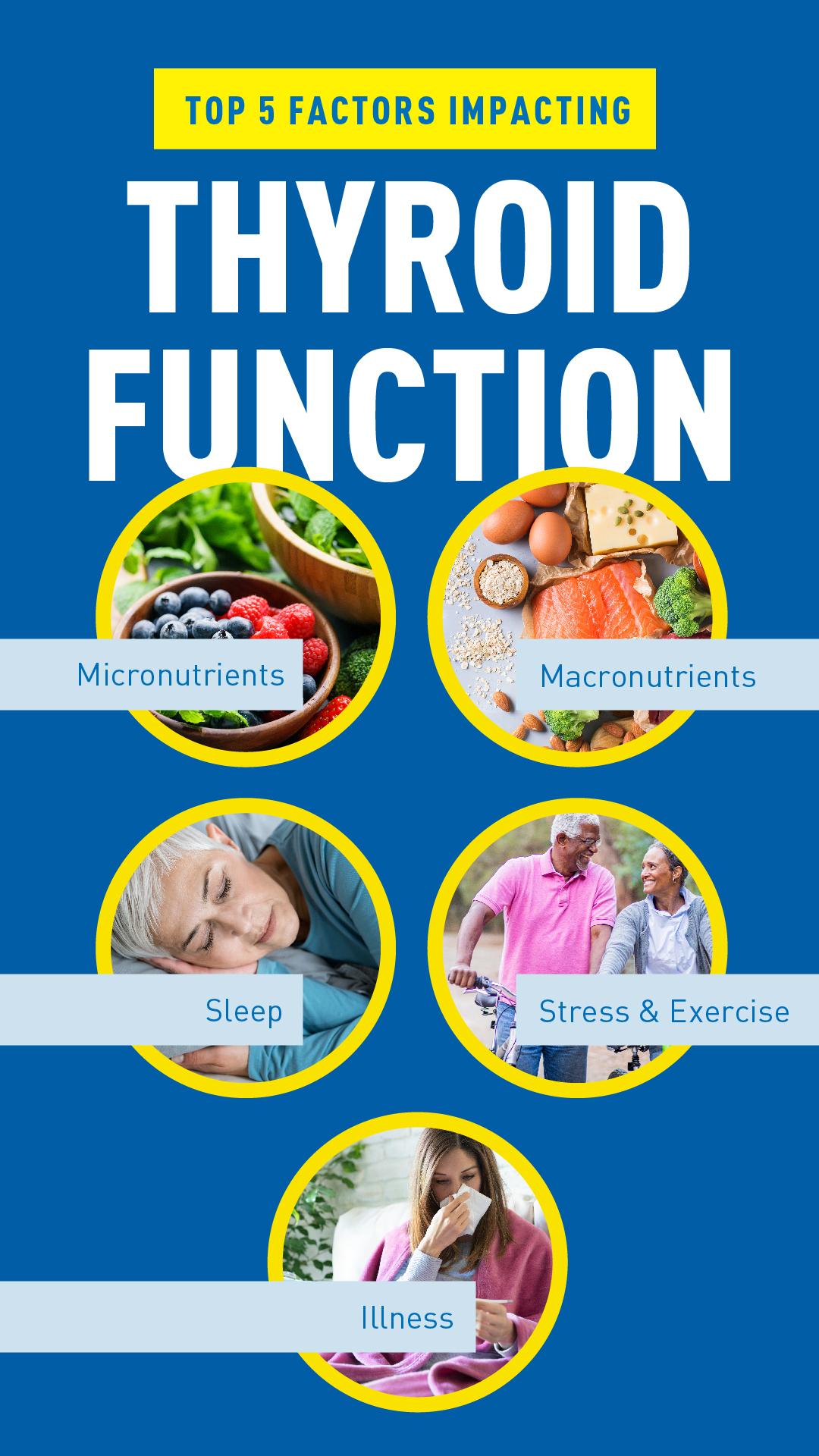Expert Advice

Acella Pharmaceuticals, LLC., is partnering with Nicole German Morgan, RDN, LD, CLT, to bring greater awareness to the importance of thyroid care and education. This post is sponsored by Acella Pharmaceuticals and should not be construed as medical advice. Please talk to your doctor about your individual medical situation.
Disclaimer: The information provided is for educational purposes only and does not substitute professional medical advice. Consult a medical professional or healthcare provider before beginning any exercise, fitness, diet, or nutrition routine.
The thyroid gland is a sensitive part of the body that is affected by the choices we make in our everyday lives. There are always opportunities for ways that we can support thyroid hormone and total health. Let’s discover the top five key factors that impact thyroid function.
1. Micronutrients
Micronutrients are most commonly known as vitamins and minerals. Research has shown that vitamins such as vitamin D and minerals such as iron, selenium and zinc play a role in supporting thyroid function.1,2 Vitamin D may be more important to monitor in those with autoimmune thyroid conditions such as Graves' disease or Hashimoto’s thyroiditis. More research is needed to determine if vitamin D modulates these autoimmune conditions.1
Iodine also plays a role in thyroid hormone production. However, it is also important not to over-consume micronutrients as there is a toxic limit to all micronutrients. It is better to speak with your qualified health care provider to determine the quantity of nutrients you need. Meanwhile, you can work to increase nutrient-dense foods such as sweet potatoes, berries or spinach, to name a few.
2. Macronutrients
Macronutrients are the building blocks of energy that we get from food: carbohydrates, proteins and fats. Research has shown that people who eat too few calories or too few carbohydrates for an extended period of time may see a drop in some thyroid hormones levels, specifically T3.3 This is thought to be the body’s protective way to conserve during a time of starvation. If your goal is weight loss, perhaps avoid extreme dieting and look to create a smaller calorie deficit to avoid adding more stress on your body's systems.
3. Sleep
We all know that sleep plays a role in optimal health, but have you thought about how it may affect the thyroid? When the body becomes sleep deprived, TSH may increase as the sympathetic nervous system becomes more active in an effort to support a deprived body.4 The body tries to increase thyroid hormone to keep the body awake and running. Conversely, it is important to remember that thyroid dysfunction may be the root cause of what affects sleep. If you do not have proper thyroid care, you may suffer from poor sleep, so it is important to seek continuous care for your thyroid condition.
4. Stress and Exercise
I lumped these two factors together as I want to bring up the topic of overexercising or overtraining and how it can cause stress on the body. First, what is overtraining? Overtraining is when you have continuously exceeded your body’s ability to recover. You can notice if you are overtraining if you cannot seem to make progress in your exercise performance, or if you notice that other areas of your life, such as sleep or mental health, are suffering. Overall, we know that with increased training comes a down-regulated or reduced thyroid response.5 However, more research is needed to better understand if overtraining can contribute to hypothyroidism. For optimal health, it is important to assess how you feel overall. Do you have increased fatigue with exercise? Perhaps change up your routine and try more recovery or lighter exercise days that involve more walking or yoga, for example.
5. Illness
Being sick with any type of illness or infection can change thyroid hormones. The good news is that if it is a temporary illness, thyroid hormones will hopefully restore to normal when you are recovered. Once you are sick, there is not as much you can do to change the situation, but knowing that some illnesses affect thyroid function is helpful in understanding your unique body.
So have you discovered what impacts your health? Going forward, you may recognize some factors mentioned in this article that you can address with your health care provider.

REFERENCES: 1. 1. Muscogiuri G, Tirabassi G, Bizzaro G, et al. Vitamin D and thyroid disease: to D or not to D? Eur J Clin Nutr. 2015;69(3):291-296. doi:10.1038/ejcn.2014.265. 2. Arthur JR, Beckett GJ. Thyroid function. British Medical Bulletin. 1999;55(3):658-668. doi:10.1258/0007142991902538. 3. Hennemann G, Krenning EP. The kinetics of thyroid hormone transporters and their role in non-thyroidal illness and starvation. Best Practice & Research Clinical Endocrinology & Metabolism. 2007;21(2):323-338. doi:10.1016/j.beem.2007.03.007. 4. Pereira JC, Andersen ML. The role of thyroid hormone in sleep deprivation. Medical Hypotheses. 2014;82(3):350-355. doi:10.1016/j.mehy.2014.01.003. 5. Austin KG, Petak S. Thyroid Therapy or Dysfunction in Athletes: Is it Time to Revisit the Clinical Practice Guidelines? Current Sports Medicine Reports. 2019;18(12):474-476. doi:10.1249/JSR.0000000000000663
1748-v1
Note that DTE products, including NP Thyroid®, have not been reviewed by the FDA for safety or efficacy.
IMPORTANT RISK INFORMATION, INCLUDING BOXED WARNING & INDICATIONS
Important Risk Information
Drugs with thyroid hormone activity, alone or together with other therapeutic agents, have been used for the treatment of obesity. In euthyroid patients, doses within the range of daily hormonal requirements are ineffective for weight reduction. Larger doses may produce serious or even life-threatening manifestations of toxicity, particularly when given in association with sympathomimetic amines such as those used for their anorectic effects.
- NP Thyroid® is contraindicated in patients with uncorrected adrenal insufficiency, untreated thyrotoxicosis, and hypersensitivity to any component of the product.
- In the elderly and in patients with cardiovascular disease, NP Thyroid® should be used with greater caution than younger patients or those without cardiovascular disease.
- Use of NP Thyroid® in patients with diabetes mellitus or adrenal cortical insufficiency may worsen the intensity of their symptoms.
- The therapy of myxedema coma requires simultaneous administration of glucocorticoids.
- Concomitant use of NP Thyroid® with oral anticoagulants alters the sensitivity of oral anticoagulants. Prothrombin time should be closely monitored in thyroid-treated patients on oral anticoagulants.
- In infants, excessive doses of NP Thyroid® may produce craniosynostosis.
- Partial loss of hair may be experienced by children in the first few months of therapy but is usually transient.
- Adverse reactions associated with NP Thyroid® therapy are primarily those of hyperthyroidism due to therapeutic overdosage.
- Many drugs and some laboratory tests may alter the therapeutic response to NP Thyroid ®. In addition, thyroid hormones and thyroid status have varied effects on the pharmacokinetics and actions of other drugs. Administer at least 4 hours before or after drugs that are known to interfere with absorption. Evaluate the need for dose adjustments when regularly administering within one hour of certain foods that may affect absorption.
- NP Thyroid® should not be discontinued during pregnancy, and hypothyroidism diagnosed during pregnancy should be promptly treated.
Indications
NP Thyroid® (thyroid tablets, USP) is a prescription medicine that is used to treat a condition called hypothyroidism from any cause, except for cases of temporary hypothyroidism, which is usually associated with an inflammation of the thyroid (thyroiditis). It is meant to replace or supplement a hormone that is usually made by your thyroid gland.
NP Thyroid® is also used in the treatment and prevention of normal functioning thyroid goiters, such as thyroid nodules, Hashimoto’s thyroiditis, multinodular goiter, and in the management of thyroid cancer.
Revised
10/2023
You Are About To Leave This Website
By clicking continue, this link will take you to a website to which Alora Pharmaceuticals’ Policies & Terms of Use do not apply.
^Based on prescriptions filled, NP Thyroid® is the #1 Prescribed DTE in the United States. Source: IQVIA National Prescription Audit (NPA) data on file. Acella Pharmaceuticals, LLC.
